Key takeaways:
- Minimalism focuses on reducing excess and appreciating meaningful items, leading to a clearer mindset.
- Ethical marketplaces promote transparency, fair trade, and sustainability, fostering trust and conscious consumer habits.
- Engaging in ethical consumption benefits society, enhances personal well-being, and often results in higher quality products.
- Evaluating consumption habits and prioritizing thoughtful purchases can enhance connection to the world and improve overall satisfaction.
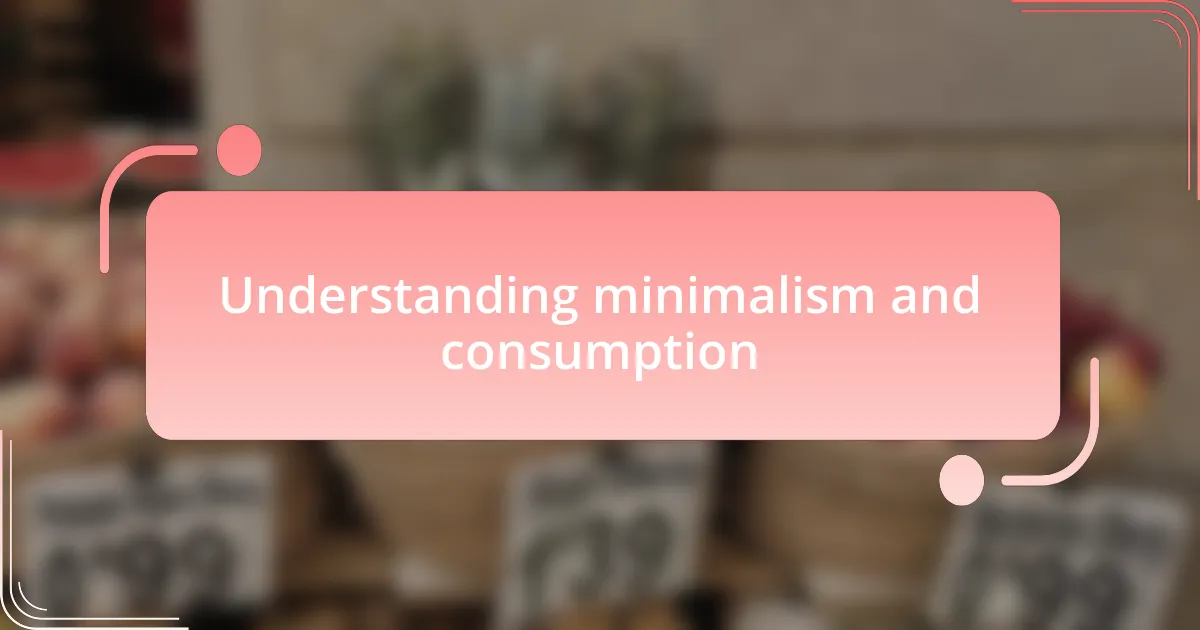
Understanding minimalism and consumption
Minimalism, at its core, is about stripping away excess to focus on what truly matters. I remember when I first decluttered my space; it felt like a weight lifted off my shoulders. It made me realize how much our surroundings influence our mindset—do we really need all those items that only gather dust, or can we find freedom in simplicity?
Consumption, on the other hand, often runs counter to the minimalist ethos. We’re bombarded with messages telling us that more is better, but does accumulating possessions really lead to happier lives? In my own experience, every time I’ve opted for quality over quantity, I’ve felt more fulfilled. There’s a certain joy in selecting a few meaningful items rather than filling my life with things that soon lose their significance.
Engaging with minimalism invites us to reconsider our habits and desires. I’ve found that asking myself, “Is this purchase adding value to my life?” can be a game-changer. When you align your buying decisions with your values, you not only consume less but also gain a deeper appreciation for what you choose to keep. Isn’t it empowering to reclaim your time and energy from consumer culture?
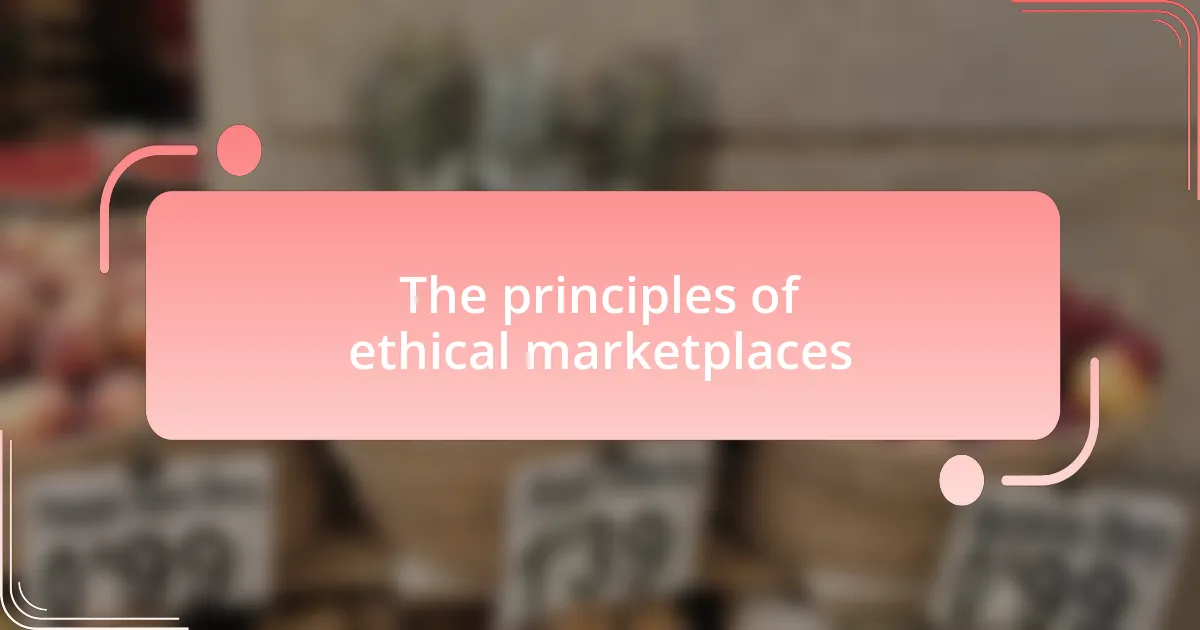
The principles of ethical marketplaces
Ethical marketplaces are grounded in transparency, where sellers openly share the origins and impact of their products. I recall discovering a local artisan who crafted goods from reclaimed materials — it was inspiring to learn how my purchase directly supported sustainable practices. This level of honesty fosters trust and encourages consumers to make informed choices.
Another essential principle revolves around fair trade practices, ensuring that producers receive equitable compensation. I vividly remember the moment I realized a simple mug I bought was made by artisans receiving fair wages. It shifted my perspective about the items I purchase; suddenly, every product had a story, and I felt more connected to the artisans behind my belongings.
Lastly, sustainability is at the heart of ethical marketplaces. Many consumers, myself included, increasingly seek out products that minimize environmental impact. I’ve made it a point to choose items that support eco-friendly initiatives, whether it’s a reusable shopping bag or a plant-based product. Isn’t it fulfilling to know that your choices not only benefit you but also the planet and its communities?
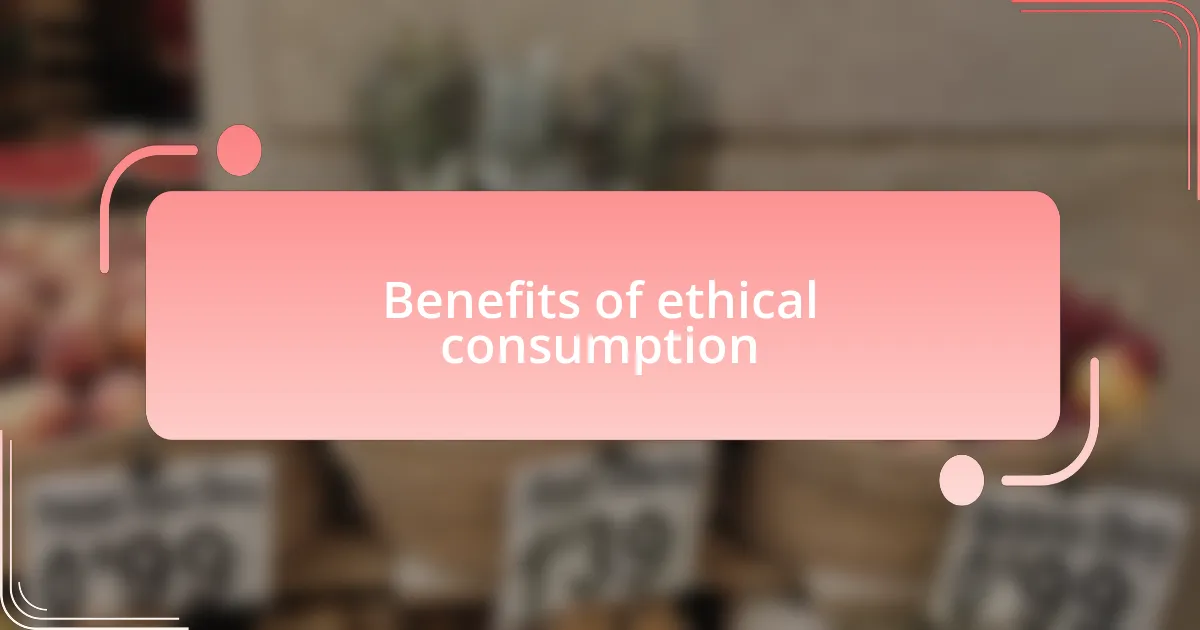
Benefits of ethical consumption
One significant benefit of ethical consumption is the positive impact it has on society. When I choose to buy from brands that prioritize ethical practices, I feel I’m contributing to communities that thrive on fair wages and sustainable methods. Have you ever pondered how your purchasing habits can fuel local economies? I’ve seen firsthand how supporting local artisans helps preserve community traditions and fosters economic growth, and it brings me immense satisfaction.
Another advantage lies in personal well-being. Engaging in ethical consumption encourages me to reflect on my values and make conscious decisions. I remember switching to a brand that focuses on cruelty-free products; not only did it align with my beliefs, but it also sparked joy knowing I was avoiding harm to animals. Isn’t it empowering when your choices resonate with your ethics, enhancing your sense of identity?
Moreover, ethical consumption often leads to higher quality items. I’ve invested in a few well-crafted pieces that have lasted over the years, compared to cheaper alternatives that quickly fell apart. This experience makes me question: is it worth saving a few bucks for something that won’t endure? For me, the durability and integrity in ethical products speak volumes, ultimately saving resources and money in the long run.
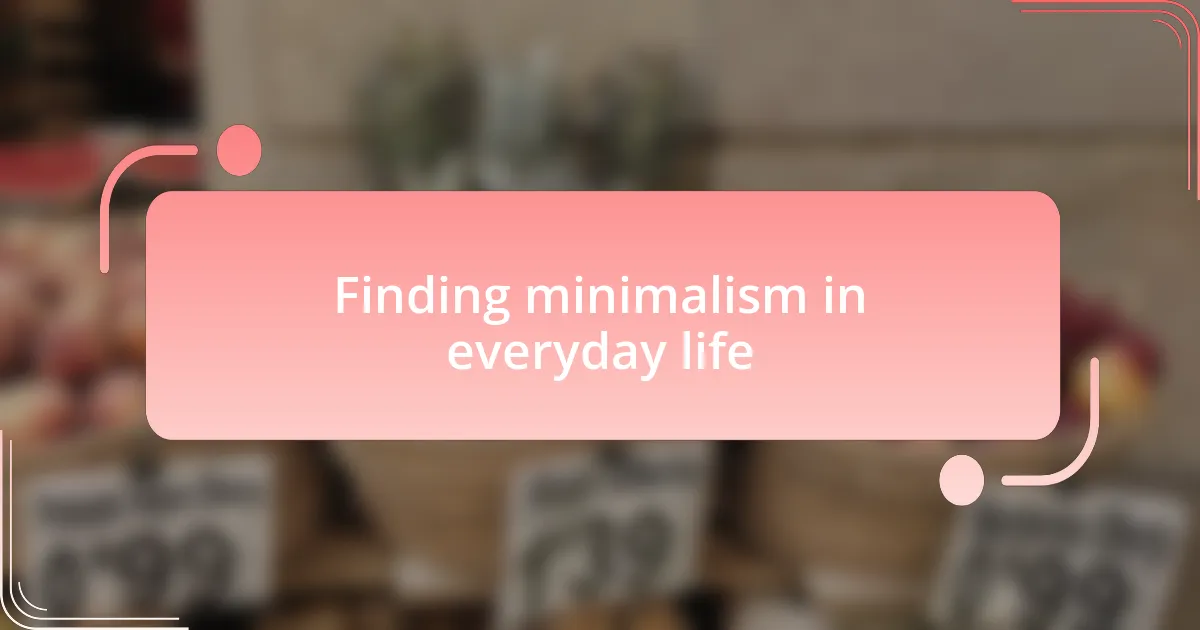
Finding minimalism in everyday life
Finding minimalism in everyday life can start with simple shifts in perspective. I’ve learned that by decluttering my physical space, I can also clear mental noise. Have you ever noticed how a tidy room brings a sense of calm? For me, parting with objects that no longer serve a purpose has been liberating.
I try to intentionally choose quality over quantity in my purchases. Recently, I focused on acquiring only versatile clothing pieces that I truly love. This approach not only simplifies my wardrobe but also allows me to express my style more clearly. It’s intriguing to think about how a few well-chosen items can reflect who we are better than a closet full of unworn clothes.
Another interesting discovery for me has been the value of experiences over possessions. I remember opting for a weekend hiking trip instead of buying yet another gadget. The joy of being immersed in nature and creating lasting memories far outweighed any temporary thrill from a new purchase. Have you considered how enriching experiences can enhance your life? They often leave a more profound mark on our happiness than material things ever could.
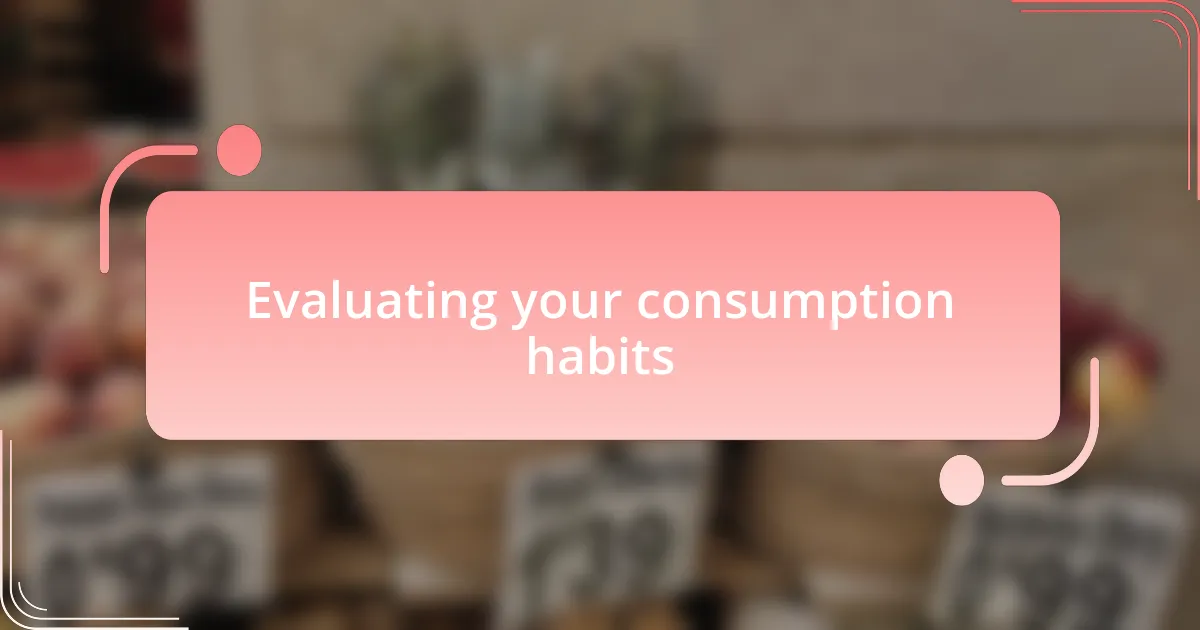
Evaluating your consumption habits
As I started to evaluate my consumption habits, I realized that not all purchases are created equal. For instance, I once bought a fancy coffee maker, thinking it would elevate my mornings. But after a few weeks, it ended up collecting dust, while I found joy in my daily ritual of brewing coffee by hand. Have you ever had a similar experience where a purchase didn’t live up to the excitement?
Reflecting on my shopping choices, I’ve noticed a pattern: many items I bought were impulsive rather than intentional. A few months ago, I logged my purchases and was shocked to find that I had spent a significant amount on things that brought little joy. This practice has made me more analytical about what I truly need versus what I merely want in the moment. Have you tried tracking your habits? It’s an eye-opening exercise that could shift your mindset.
Additionally, I find it insightful to consider the story behind my purchases. When I buy fair trade products, for instance, I feel a strong connection to the artisans and the values they promote. This emotional aspect cultivates a sense of responsibility in my choices. How often do we pause to appreciate the human element behind the items we consume? Evaluating our consumption in this way doesn’t just lead to better decisions; it enhances our connection to the world around us.
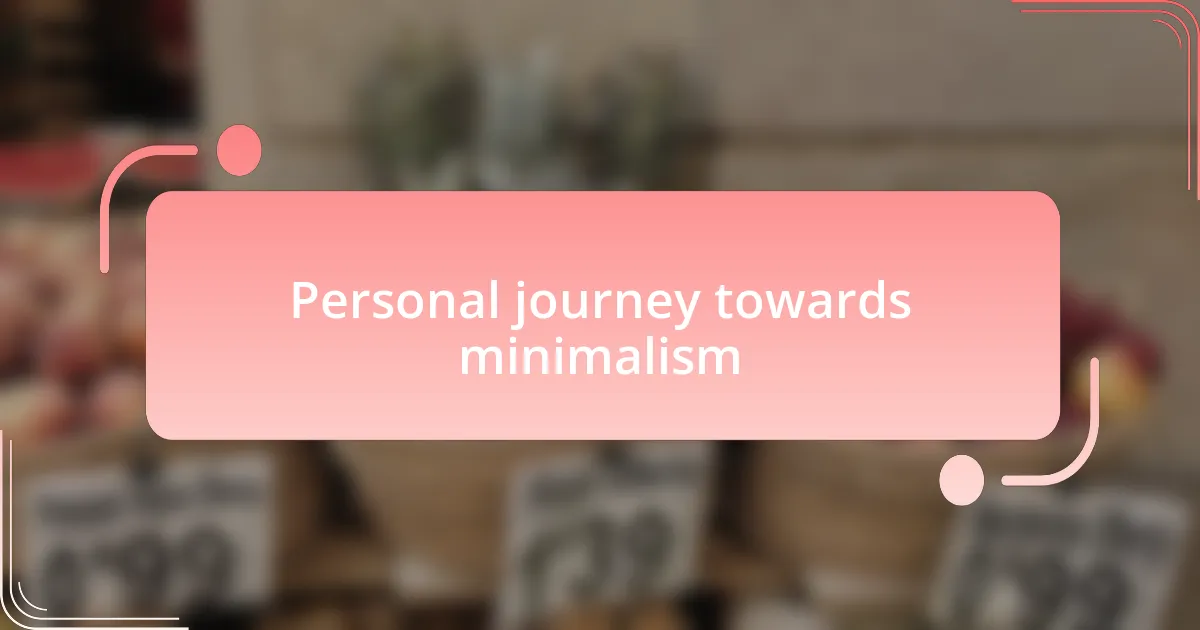
Personal journey towards minimalism
As I embraced the idea of minimalism, the first step was decluttering my space. I started with my closet, pulling out clothes I hadn’t worn in years. Each item I held brought memories, but I discovered that letting go was surprisingly liberating. Have you ever felt the weight of unused items lingering in your home? It’s remarkable how clearing physical space can also clear mental clutter.
Over time, I became more intentional about what I chose to bring into my life. One day, I found myself eyeing a beautiful but unnecessary decorative piece. Instead of purchasing it on impulse, I paused to ask myself, “Will this add value to my life?” That moment of reflection sold me on the importance of thoughtful consumption. I realized that true joy comes not from surrounding myself with things but from savoring experiences and connections.
Reflecting on my journey, I see minimalism as more than just a lifestyle choice; it’s a mindset. It has shifted my focus from acquiring to appreciating. I often ask myself, “What truly enriches my life?” This mental shift creates a deeper appreciation for what I already have. Have you ever considered how your mindset about possessions impacts your happiness? For me, the path to minimalism has been an enlightening exploration of what it means to live meaningfully.
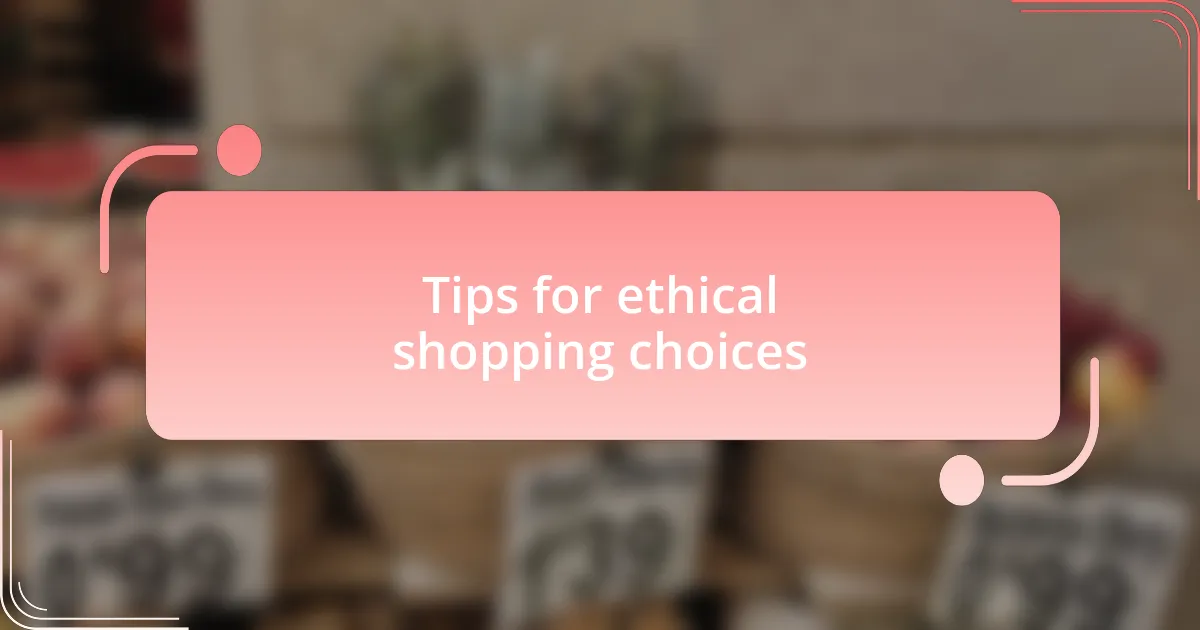
Tips for ethical shopping choices
When I’m out shopping, I always remind myself to prioritize quality over quantity. The last time I needed a new pair of shoes, instead of purchasing the cheaper option that would wear out quickly, I invested in a sustainable brand known for making durable products. It felt great knowing I wasn’t just buying a pair of shoes; I was supporting responsible manufacturing practices.
I also find it incredibly helpful to research companies before making purchases. Recently, I stumbled upon an ethical clothing line that openly shared their supply chain practices. Reading about their commitment to fair wages and eco-friendly materials reassured me that my money was going towards something positive. Have you ever taken a moment to reflect on where your purchases come from? It really makes me consider my impact as a consumer.
In addition to being mindful of brands, I think about the necessity of the items I buy. Just a few weeks ago, I had a moment of clarity while standing in front of a shelf filled with tempting kitchen gadgets. I asked myself, “Will this really make my cooking easier, or will it just take up space?” That simple question helped me walk away and ultimately save money while embracing the idea of minimalism in my shopping choices.